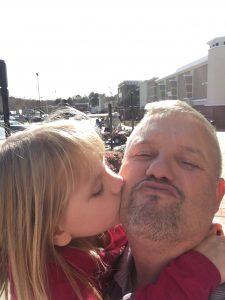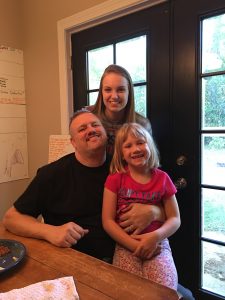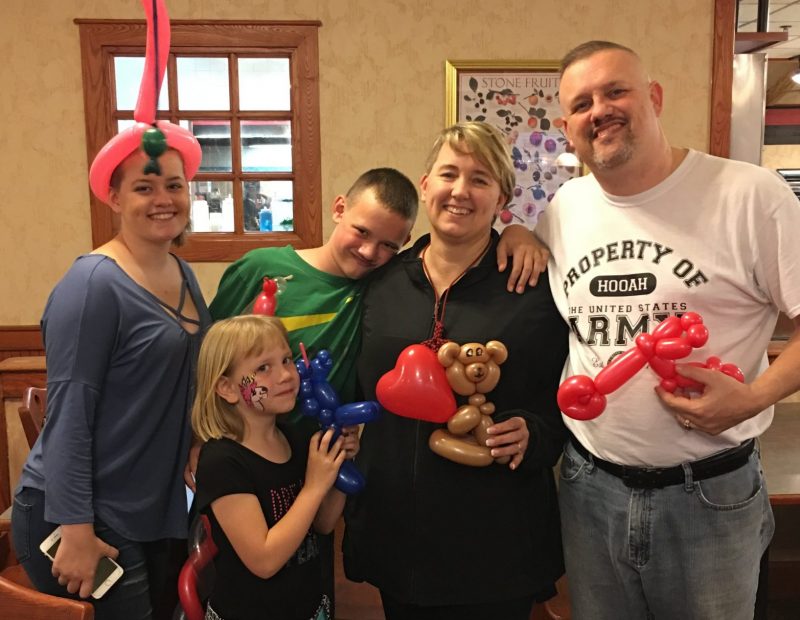By Leo Donnell
My name is Leo Donnell, and I am the founder of One Happy Widow. I help widowed people pivot from grief to growth in their life after loss.
In 2017, I was married and raising four children with my husband Dewey. He was only 42, but had already been discharged from the Army on a medical disability. On Valentine’s Day, he was diagnosed with terminal cancer, and our world instantly turned upside down.
Our focus changed from long-term home-buying and retirement plans to doing everything for the “last” time. Family trips, birthdays, holidays, and all other milestones were overshadowed by the heavy reminder that it would be the last one with Daddy. Daily schedules became focused on chemo appointments, pain management, and celebrating if he was able to poop that day. That time period seems like a dream now.
 On June 10, we celebrated our 17th wedding anniversary. One week later he died — one day before Father’s Day. This past weekend, we recognized the 6th anniversary of his death. It feels like a lifetime ago, and yesterday all at the same time.
On June 10, we celebrated our 17th wedding anniversary. One week later he died — one day before Father’s Day. This past weekend, we recognized the 6th anniversary of his death. It feels like a lifetime ago, and yesterday all at the same time.
During my initial grief, I kept having this feeling that I wasn’t “doing it” right. I wasn’t crying enough, or I was crying too much. I talked about him so much that it bothered others, or I failed to mention him and others accused me of forgetting him too quickly. Nobody has a course on how to be a widow (trust me, I looked!), but I did find myself in lots of Facebook groups focusing on widowhood.
Eventually, I decided to start my own group and share my experiences of widowhood in a YouTube channel that I called One Happy Widow. I had met and married a fellow widower, and we were traveling on this grief journey together, and helping each other find happiness after our losses. People who find the videos often comment that they can relate to my stories and it helps them when they think they aren’t “doing it” right either. There is no wrong way to grieve, we each travel our own journey.
One of my videos became very popular, where I shared 12 things I learned when I became a widow. Here is an overview of the topics I covered:
1. Time is never enough:
Regardless of the duration of your relationship, losing your partner feels like an eternal loss. Whether you spent one day or several decades together, the feeling of being robbed of precious moments is universal among widows. I was married for 17 years, but even that seemingly substantial time felt like a mere blink of an eye.
2. I knew, but I still wasn’t ready:
Even if you anticipate your spouse’s passing due to illness or other circumstances, the emotional preparation is never enough. The grief journey begins long before the actual loss, as you have terminal conversations, create wills, or gather important documents. No matter how much you do to prepare, you will never be fully able to comprehend the gravity of the loss to come.
3. Memories of the funeral:
In the midst of grief, certain details of the funeral and burial become hazy, if not entirely forgotten. The intensity of emotions can create a numbing effect, protecting our minds from fully absorbing the traumatic events surrounding the loss. I have struggled to recall specific moments of the funeral, such as where I sat or how I got there. The mind has its defense mechanisms, and it chooses what to preserve and what to shield us from.
4. The emotions of fresh grief:
 The immediate aftermath of losing a spouse is filled with a huge mix of emotions. Surprisingly, my initial reaction wasn’t overwhelming sadness; it was relief. My husband had battled cancer and experienced excruciating pain, so his release from suffering brought me a sense of solace. The relief was immediately followed by guilt. How could I be relieved that my husband just died? What would people think if they knew what was going on in my head at that moment? Finally, numbness, as if my emotions had momentarily shut down. Sadness took a backseat and patiently waited to attack later, but never very far away.
The immediate aftermath of losing a spouse is filled with a huge mix of emotions. Surprisingly, my initial reaction wasn’t overwhelming sadness; it was relief. My husband had battled cancer and experienced excruciating pain, so his release from suffering brought me a sense of solace. The relief was immediately followed by guilt. How could I be relieved that my husband just died? What would people think if they knew what was going on in my head at that moment? Finally, numbness, as if my emotions had momentarily shut down. Sadness took a backseat and patiently waited to attack later, but never very far away.
5. Legal matters and unforeseen conflicts:
Dealing with the aftermath of a loved one’s death involves various practical matters, such as wills, life insurance, and estates. Unfortunately, death can bring out the worst in people, leading to unnecessary disagreements and lengthy legal battles. These unexpected challenges can further complicate the grieving process and require immense emotional strength to navigate.
6. The ebb and flow of support:
Initially, people rally around you, offering their condolences, support, and even meals. But as time passes, the world continues moving forward while your life is forever altered. The people who were there in the beginning may gradually fade away, leaving you feeling isolated in your grief. This can bring about a deeper feeling of loneliness.
7. The art of insensitive comments:
Throughout your journey as a widow, you will encounter well-intentioned individuals who say things that come across as heartless or inconsiderate. People often resort to clichés in an attempt to offer solace without fully comprehending the depth of your pain. I’ve heard my fair share of thoughtless remarks, and while most people mean well, it can still be hurtful. Remember to focus on the intentions behind the words rather than the words themselves.
8. Rediscovering your identity:
Losing a spouse not only changes your relationship status but also shakes the foundation of your identity. For years, you may have defined yourself as part of a couple, and suddenly you are faced with redefining who you are as an individual. This process can be both daunting and liberating. It’s an opportunity to reconnect with your passions, explore new interests, and rediscover yourself in ways you never thought possible.
9. Embracing the rollercoaster of grief:
Grief is a nonlinear journey that takes you on a rollercoaster of emotions. One moment, you may feel a sense of acceptance and peace, and the next, overwhelming sadness may wash over you. Understanding that grief has no set timeline, embrace the highs and lows, knowing that each wave brings you closer to finding a new sense of normalcy.
10. Love and laughter after loss:
While grief may seem all-consuming, it doesn’t mean that love and laughter are lost forever. As time goes on, you may find yourself open to new relationships and connections. It’s important to give yourself permission to love again and allow happiness to enter your life. Finding joy and laughter in the midst of grief is not a betrayal; it’s a testament to the resilience of the human spirit, and a chance to make the most of the days that your spouse never got to have.
11. Cherishing the memories:
Memories are the threads that connect us to our loved ones even after they’re gone. Cherishing the memories you shared with your spouse and finding ways to honor their legacy can bring comfort and solace. Whether it’s creating a memory box, writing in a journal, or participating in activities that your spouse loved, preserving their memory allows you to keep them alive in your heart.
12. The strength within:
Becoming a widow forces you to tap into a well of strength you may not have known existed. It’s a journey that tests your resilience, courage, and ability to adapt. While the pain may be overwhelming at times, remember that you have the strength within you to navigate this new chapter of your life. Lean on your support network, seek professional help if needed, and believe in your own self.
Conclusion:
Becoming a widow is an indescribable experience that forever changes your life. Through the pain and challenges, there are valuable lessons to be learned and moments of growth and healing to be discovered. Remember that you are not alone on this journey and that there are others who have walked this path before you. Embrace the love, laughter, and memories that remain, and find solace in the strength that lies within you.
For more information about Leo, you can check out her website.
Support us by driving awareness!
Subscribe to our YouTube channel at YouTube.com/GrapGrief.
Follow us on Facebook at Facebook.com/GrapGrief and on Instagram at Instagram.com/GrapGrief.







